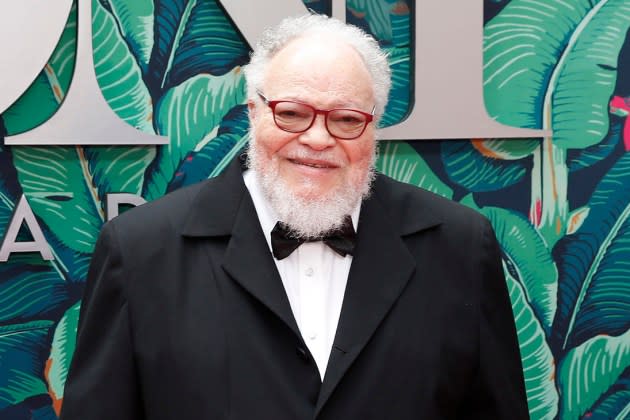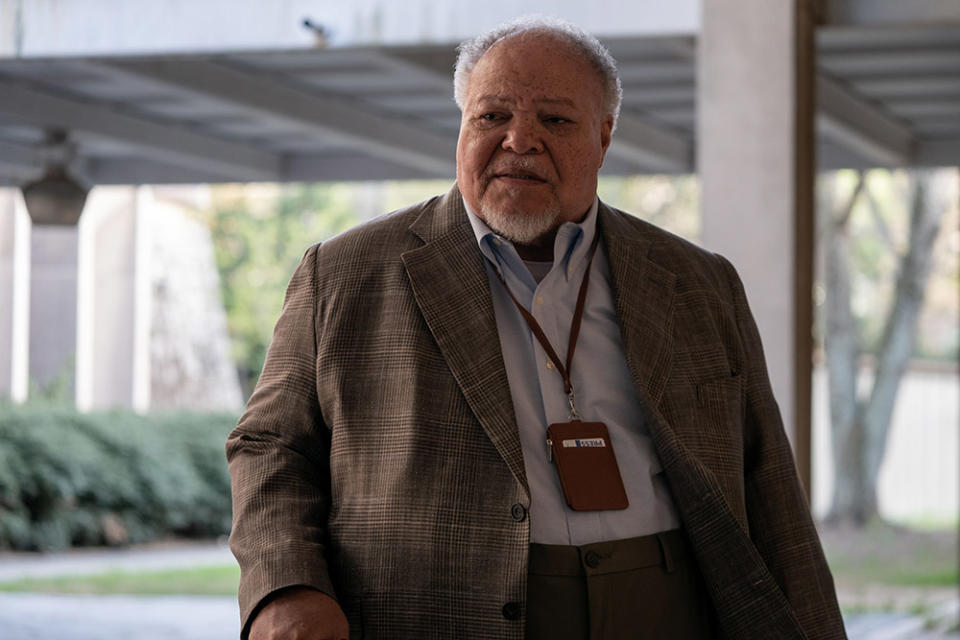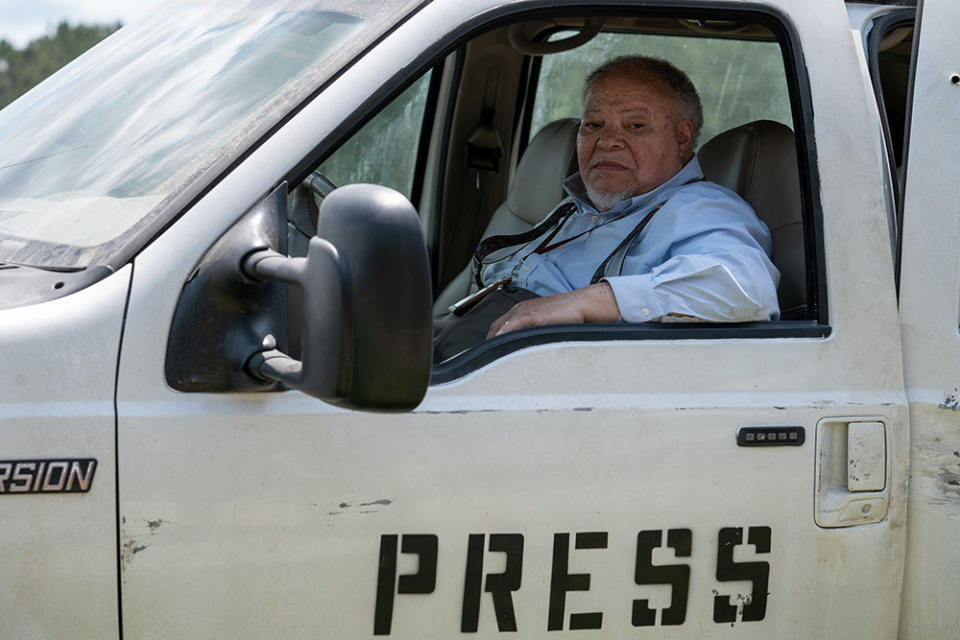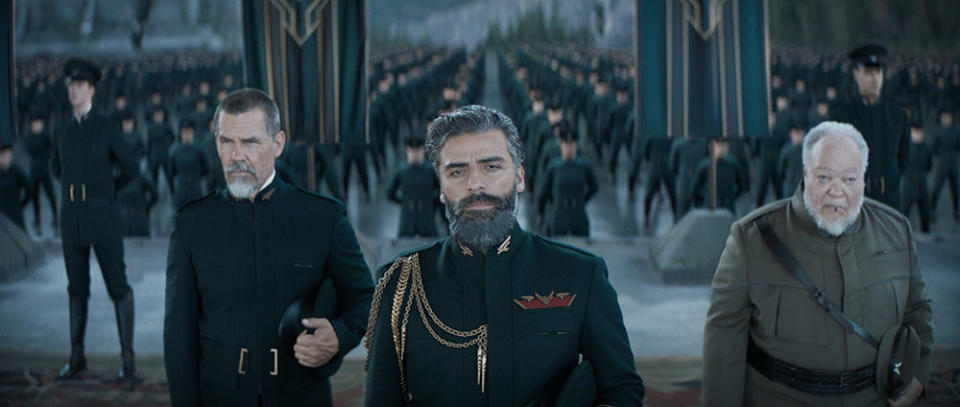Stephen McKinley Henderson Talks ‘Civil War’ Timelessness and “Faithful” ‘Dune: Part Two’ Story

When Stephen McKinley Henderson appears on screen, you always know you’re in good hands. The presence of the beloved character actor all but guarantees that he’s going to pass on some eye-opening wisdom and make you feel something, which explains why his two-time co-star Cailee Spaeny considers him the Yoda-like figure in her life. The two Missouri natives previously worked together on Alex Garland’s gem of a sci-fi miniseries, Devs, and now they’ve reunited on the big screen in the English filmmaker’s critically acclaimed anti-war thriller, Civil War.
Civil War, which is Henderson’s fifth A24 collaboration, begins in the near future, as secessionists are on the verge of seizing the White House from its dictatorial, third-term president (Nick Offerman). Reuters war photographer Lee Smith (Kirsten Dunst) and her reporting partner, Joel (Wagner Moura), intend to chronicle the events as they unfold from New York City to the nation’s capital, and Henderson’s Sammy tries to talk his one-time protégé out of embarking on such a dangerous journey. But the veteran New York Times journalist ultimately concedes by asking Lee for a ride to Charlottesville. Spaeny’s rookie photojournalist, Jessie Cullen, then tags along at the last minute after some crafty maneuvering.
More from The Hollywood Reporter
Zendaya Says She Got "Really Lightheaded" While Wearing Viral Mugler Robotic Bodysuit
'28 Years Later': Nia DaCosta in Talks to Direct Second Film in Sony Trilogy
Cailee Spaeny Talks 'Civil War,' Taylor Swift's 'Mare of Easttown' Fandom and Manifesting 'Matrix 5'
At a time when real-life politicians and militant organizations are recklessly throwing around terms like “secession” and “civil war,” Garland’s film serves as a well-timed warning for what could potentially happen if Americans continue on this current path of extreme polarization. For Henderson, the film’s implicit message applies to any time and place where people have closed themselves off.
“[Civil War] is an important film, but I also know that it’s timeless. It’s not about any particular place or time,” Henderson tells The Hollywood Reporter. “It’s about any place or time where people stop communicating and stop caring about the truth, and that’s a dangerous thing. So journalists make sure you see that, and great filmmaking also makes certain that you see how things actually are.”
Henderson reprised his role as House Atreides mentat Thufir Hawat on the Budapest-based set of Denis Villeneuve’s Dune: Part Two, however, he wound up not making the blockbuster sequel’s final cut. Henderson acknowledges that he has feelings of disappointment, but he remains honored and flattered that Villeneuve conceived his version of Thufir Hawat with him in mind.
“Sometimes, you have to take one for the team, and Denis went into the editing room and he came out with a wonderful film. So I can say I was disappointed, but not heartbroken,” Henderson says. “It was such a kick to shoot what I did shoot in Part Two. I also had a great lunch with Christopher Walken that I’ll never forget.”
He also confirms that Hawat’s deleted storyline aligned with Frank Herbert’s 1965 novel. For the uninitiated, Hawat gets captured in the midst of the Harkonnens’ ambush on the newly relocated House Atreides, and Baron Vladimir Harkonnen then forced the mentat to replace his own fallen mentat, Piter de Vries. Hawat would go on to manipulate the Harkonnens from within, pitting the Baron and his nephew, Feyd Rautha Harkonnen, against each other.
“[Villeneuve] was faithful [to the book]. I’ll simply put it that way. He was faithful in what he shot, so that’s about as far as I can go with it,” Henderson admits with caution.
Below, during a recent conversation with THR, Henderson also discusses Garland’s decision to not choose sides in Civil War’s central conflict, instead basing the film in the objective perspective of its journalist characters.
When Devs wrapped, I heard that Alex Garland promised to write new roles for all of you. With Civil War having six Devs actors, that story must be true, right?
Well, he said that he wanted to have an [acting] company and that he would love to keep us together. So, yeah, I guess it did mean that he’d write [new roles for us], but the first time he contacted me [after Devs], it was for a completely different story. So it evolved in his head, but he’s really brilliant, man. You love working with people who are smarter than you, but also don’t lord it over you. He’s really easy to talk to, and as Nick [Offerman] has often said, it’s a joy to be in Alex’s stable.

I loved your dynamic with Cailee Spaeny on Devs, and so I was predisposed to appreciate the backseat juxtaposition that your characters have in Civil War. Sammy is the seasoned veteran and Jessie is the novice, and he tries to offer her his wisdom just as Stewart from Devs tried to teach Lyndon (Spaeny) about jazz.
(Laughs.)
Did the two of you pick up right where you left off on Devs?
She is such a joy, and we’re both from Missouri. She approached me right away [on Devs] and said, “I know you were born in Missouri, but you grew up in Kansas. My dad was born in Kansas, but we live in Missouri.” So we did pick up right where we left off, but we really never left off because we stayed in touch. She’s just a wonderful person and a fabulous actor.
So why does Sammy want to go on this dangerous journey, especially when he’s being discouraged from doing so?
Well, he says he wants to go as far as Charlottesville, and he may want to visit a place that means a lot to him. It might even be a cemetery that he wants to visit and pay homage to. It’s a location that means a lot to him, and he’d rather be with these people than anybody else at this time in the country. He knows precisely how dangerous it is, but he gets to spend time with these folks and go back to whatever his meaningful place is. So it’s one from the heart.
Your character has a very heroic moment that I won’t reveal here. Was that a key selling point, even if you didn’t need much convincing?
It is such a joy to be in my seventies and be in an action movie. (Laughs.) That’s the first kick. But yes, I’ve had a few screen moments that I am really, really proud and happy to be a part of, and that is certainly one. It’s dangerous to even talk about it, but yes.
Whenever a movie or show comments on a character’s age or appearance, positively or negatively, I always feel for the actor, because it’s ultimately a judgment on their age or appearance, barring prosthetics and any other form of artifice. So, when you hear dialogue, or even deliver it yourself, that says your character doesn’t have what it takes for this mission, is it hard to not take it personally on some level?
Well, it’s all the steps you took to arrive at that age and at that appearance, and how the years manifest themselves on you. And so I am very happy and proud to be a part of a film like this, and to be right for this part. I played the whole game and I got good cards the whole way, and this is the hand that I’ve got now. So it’s personal, but it’s what you give as an actor. You give, personally. When you give yourself to a character, you give every part of yourself, warts and all, and it allows for the heroic moment. You probably get a lot of stuff out of people that they never talk about, but because of all that, I got to have that moment. So it is deep and personal.

Civil War is one of the first times where I’ve watched a movie and genuinely wondered if I was watching our own future. Did you also ask yourself this very question during filming?
Well, I was looking at the news every day and seeing Ukraine. And then I’d go to our set, and I’d realize that this is something that we would never want to happen here. Also, I live in Buffalo, New York. So, during the course of the filming, I went home for a weekend, and it was the weekend that a terrible thing happened at the Tops grocery store in Buffalo. [Writer’s Note: On May 14, 2022, ten Black Americans were murdered by a mass shooter inside Buffalo’s Jefferson Ave Tops supermarket.]
I was born in ‘49. So I grew up in the ‘50s and ‘60s, and that’s when I realized the courage of journalists and how much it affected me and enlightened me at the time. The Emmett Till photograph [in ‘55]. So, what journalists did during that time opened my eyes and got me reading things that I perhaps would not have read. It got me to look deeper to find the truth of things.
So [Civil War] is an important film, but I also know that it’s timeless. It’s not just about any particular place or time. It’s about any place or time where people stop communicating and stop caring about the truth, and that’s a dangerous thing. So journalists make sure you see that, and great filmmaking also makes certain that you see how things actually are.
I’m sure you knew that this film would strike a chord with people given the political divide in this country. Could you sense a collective anxiety amongst your castmates as to how Civil War would be received?
I didn’t feel that, and that’s such a hard thing to fall into. It was a wonderful set to share together, and to get along as well as we did, we really respected and honored each other. We knew we were making a movie, and we were making a movie that we wanted to be a part of. It’s a wonderful character-driven drama and fabulous action film.
But the objectivity of journalists was more important than either side of the divide, and there is one. You can’t deny that there is division in the country today, but it’s more about the objectivity of urging people to talk to each other. See the film and talk to each other about it. It might make some dialogue occur that might not have occurred otherwise, and that’s a wonderful thing about any work of art.
You likely experience a version of this on film and TV sets, but do you understand the psychology of people who will stop at nothing to get a shot or photograph?
Yeah, I do understand. I understand people who are driven. They have found their calling, and Sammy knows he’s found his calling. He also sees that the standards of journalism are in good hands with the coming generation, and he’s glad to have been a part of guiding them, to a certain extent. Everyone has their own fingerprint and DNA, but as an instructor and as a teacher, all you can do is show that standard. So, keep it high.
As you just mentioned, Sammy and Kirsten Dunst’s character, Lee, have history as mentor and protégé, and it’s particularly evident when they share a joint together. Did the two of you need much backstory to get where you needed to go?
It was all there in the text, and we actually had a week of rehearsal without shooting anything. The four of us and Alex read the script and looked at documentaries, so there was a shared history during that week. We got very close, and we also got close through music. Jesse [Plemons] and Kirsten have a love of music, and they both were going through Oscar week, so she asked me about it. I had attended with Fences some years before, and it was just an exciting, wonderful time to be able to observe what she was going through and talk to her about it. So we got close in a real compact period of time, and Alex’s wonderful text allowed it. It was all right there. It was very available.

We spoke for Dune a few years ago, and so I was heartbroken when I realized that Dune: Part Two didn’t go your way. It must’ve been a very difficult edit for Denis considering he wrote your character with you in mind. So was that a tough pill to swallow?
Well, sometimes, you have to take one for the team, and Denis went into the editing room and he came out with a wonderful film. It really is a wonderful film. So I can say I was disappointed, but not heartbroken. I’m still glad to be a part of Denis’ vision. He’s a wonderful filmmaker, and it was such a kick to shoot what I did shoot in Part Two. I also had a great lunch with Christopher Walken that I’ll never forget. It happened to happen because we ran into each other in the restaurant. And [working with] Austin [Butler] and Stellan [Skarsgård] and Timothée [Chalamet], I have no regrets whatsoever about being a part of the family. And that crazy Josh Brolin! Boy, that guy is fabulous.
The footage may be on the cutting room floor, but the experience will always be with you.
Absolutely. I’ll always have Budapest.
Did Thufir’s subplot align with the book? Did he play mind games with Harkonnens and pit them against each other?
I don’t know how legal all this is, but the book, yeah. I mean, it was a favorite of Denis’. He’d been wanting to do this for years and years and years, and he was so wise to do it in two parts. So, by the time he got to the second part, he was faithful. I’ll simply put it that way. He was faithful in what he shot, so that’s about as far as I can go with it.
Before Beau Is Afraid came out, you told me that you had a scene with Patti LuPone, and two-and-a-half hours into that movie, I asked myself if your scene with Patti got cut. But then, right on cue, your character came strolling out of the bathroom to shock us all. So I kept holding out hope that Thufir Hawat would also emerge from a bathroom inside the Palace at Arrakeen.
(Laughs.) Yeah, I thought there’d maybe be a flashback at one time, but no, it wasn’t to be. But, boy, that was a great day to spend with Patti [on Beau Is Afraid], and I’m so glad you remember that. She and I went to school together, but we’d never worked together after all these years. So that was just a great day to spend with her.
During your downtime in the SUV on the Civil War set, did you turn on some Coltrane?
My man! We didn’t [play any Coltrane], but there was some [Bob] Dylan and Richie Havens, which was a whole other kind of vibe. But, if you have to get away from someplace and you need a wheelman, Wagner Moura is your guy, man. Wagner is the man, and he can wheel a car. So it was great times and great memories.
***
Civil War is now playing exclusively in movie theaters.
Best of The Hollywood Reporter


